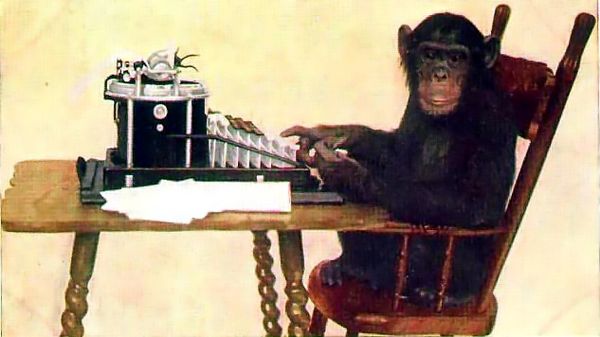
Ok, my newsfeeds are absolutely flooded this morning with news of infinite monkeys typing out the works of Shakespeare. Or, more specifically, not doing that.
The headlines all say basically the same thing — “Chimpanzees will never randomly type the complete works of Shakespeare.“
But if you click through to any (well, most) of these articles, you’ll see what they really mean. And it’s not even really news unless you’ve fundamentally misunderstood the concept of “infinite.”
Take this BBC version of the article:
Two Australian mathematicians have called into question an old adage, that if given an infinite amount of time, a monkey pressing keys on a typewriter would eventually write the complete works of William Shakespeare.
…Which means that while mathematically true, the theorem is “misleading”, they say.
Once upon a time, when we were all small children and first tried to wrap our heads around the concept of infinity, I think we all did the same thing. We all imagined the biggest possible number we could and thought that infinity is kind of like that. That’s all that’s happening here. In this case, we’ve decided to replace “infinity” with “lifespan of the universe.” It’s the adult scientific equivalent of the first-grader who thought “a zillion zillion.”
But the “infinity is just the biggest number you can imagine” argument was wrong then, and it’s still wrong, and scientists know it. Infinity is not a number. This was never a statistical probability problem. You have to think “without limit,” so you can’t treat it as math.
But it’s not an entirely meaningless question. For example, if we say, “Is the monkey guaranteed to write Shakespeare, given infinite time?” the answer is no. There’s no guarantee that our monkey will create all possible sequences, no matter how much time he’s given.
You could also flip the question and ask, “What if I had infinite monkeys?” This changes the question a little bit, because what do we do with the time variable? Infinite monkeys with infinite time could indeed still generate garbage forever. But what if we fixed that other param? What if we said, “An infinite number of monkeys types 50,000 characters.” That number can be whatever you want, but it’s still going to be a fixed and finite number. Now let’s also throw out the trivial “what if they all type the same thing” edge case and say, no repeats. No monkey will type the same 50k characters as another monkey. In that case, yes, one of the monkeys would produce the first 50k characters of Shakespeare’s work. At least, I think so. There’s a reason why scientists still study this stuff.
The introduction of a finite parameter does bring the math back into the realm of interesting, though, and the Australian scientists of the article know this:
There would be a 5% chance that a single chimp would successfully type the word “bananas” in its own lifetime. And the probability of one chimp constructing a random sentence – such as “I chimp, therefore I am” – comes in at one in 10 million billion billion, the research indicates.
That, I think, is more interesting than the catchy headline everybody went with. This gets it back into the realm of actual statistics because we’ve got numbers, not infinities, to work with. In both those examples you have finite monkeys and a finite amount of time. But that’s not as fun, I guess.
